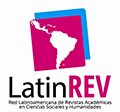Comunicación intercultural en la organización
DOI:
https://doi.org/10.22235/d.v0i17.354Resumen
La comunicación intercultural es un campo de estudio vasto, complejo y aún hoy bastante indefinido, a pesar de tener una trayectoria de investigaciones y teorías que se remontan a los años 50. En el marco de los estudios organizacionales que se enfocan en la problematización de la gestión intercultural a principios de este siglo, la comunicación no aparece como un objeto de estudio, sino como un tema transversal que atraviesa otros fenómenos organizacionales como el liderazgo, el trabajo en equipo, la generación y transferencia de conocimiento o el cambio. La interpretación de los mensajes y la construcción de sentidos conjuntos aparecen como los procesos clave a analizar para evitar conflictos interculturales.
Palabras clave: comunicación intercultural, organización, interpretación de mensajes, construcción de sentido.
Intercultural communication is a vast and complex field of study, relatively undefined to this day, despite having a research and theoretical background that goes back to the 1950s. In the context oforganizational studies that focus on the problem of intercultural management at the beginning of this century, communication studies do not appear as a subject of research, but as a cross topic among other organizational phenomena such as leadership, team work, knowledge creation and transfer or change. The interpretation of messages and the construction of common meanings appear as the key processes to analyze in order to avoid intercultural conflict.
Key words: intercultural communication, organization, message interpretation, meaning construction
Descargas
Citas
Asch, S. E. (1952): Social Psychology, Engle-wood Cliffs, NJ, Prentice-Hall.
Bhagat, R. S. Kedia, B. L., Harveston, P. D., Triandis, H. C. (2002): “Cultural Variations in the Cross-Border Transfer of Organizational Knowledge: An Integrative Framework”, The Academy of Management Review, vol. 27, nº 2 (abril, 2002), pp. 204-221.
Dahl, Stephan (2004): “Intercultural Research: The Current State of Knowledge” (enero, 2004), Middlesex University Discussion, paper nº 26, en SSRN: (15.9.12).
Gibson, Cristina y Vermeulen, Freek (2003): “A Healthy Divide: Subgroups as a Stimulus for Team Learning Behavior”, Administrative Science Quarterly, vol. 48, nº 2 (junio, 2003), pp. 202-239.
Glinow, M. A., Shapiro, V. D., BrettSource, J. M. (2004): “Can We Talk, and Should We? Managing Emotional Conflict in Multicultural Teams”, The Academy of Management Review, vol. 29, nº 4 (octubre, 2004), pp. 578-592.
Gudykunst, William B. (1985): "Intercultural communication: Current Status and Proposed Directions", pp.1-46 en Dervin, Brenda y Voigt, Melvin J. (eds.): Progress in Communication Sciences, vol. VI, Norwood, New Jersey, Ablex.
Gudykunst, William B. (1987): "Cross-Cultural Comparisons", pp. 847-889 en Berger, Charles R. y Chaffee, Steven H. (eds.): Handbook of Communication Science, London, Sage.
Gudykunst, William B. y Ting-Toomey, Stella (1988): Culture and Interpersonal Communication, London, Sage.
Hofstede, Geert H. (1980): Cultures consequences. Comparing Values, Behaviors, Institutions and Organizations across Nations, London, Sage.
Kennedy, J. C. (2002): “Leadership in Malaysia: Traditional Values, International Outlook”,The Academy of Management Executive (1993-2005), vol. 16, nº 3 (agosto, 2002), pp.15-26.
Kidder, L. H. y Miller, S. (1991): “What is 'fair' in Japan?”, en H. Steensma y R. Vermunt (eds.), Social justice in human relations: Societal and psychological consequences of justice and injustice, vol. 2, pp. 139-154. New York, Plenum Press.
Mangaliso, M. P. y Damane M. B. (2001): “Building Competitive Advantage from 'Ubuntu': Management Lessons from South Africa”, The Academy of Management Executive (1993-2005), vol. 15, nº 3, Themes: Insightsfrom Sports, Disasters, and Innovation (agosto, 2001), pp. 23-34.
Michailova, Snejina (2000). “Contrasts in Culture: Russian and Western Perspectives on Organizational Change”, The Academy of Management Executive (1993-2005), vol. 14, nº 4, Themes: Strategy, Culture, and Change (noviembre, 2000), pp. 99-112.
Montoya-Weiss, Mitzi M., Massey, Anne P. y Son, Michael (2001): “Getting It Together: Temporal Coordination and Conflict Management in Global Virtual Teams”, The Academy of Management Journal, vol. 44, nº 6 (diciembre, 2001), pp. 1251-1262.
Rodrigo Alsina, M. (1999): Comunicación intercultural, Barcelona, Anthropos.
Rodrigo Alsina, Miquel. “La comunicación intercultural”, Portal de la comunicación. Aula abierta, Lecciones básicas, disponible en: <http://www.aulaintercultural.org/article.php3?id_ article=22> (15.9.12).
Schippers, M. C., Den Hartog, D. N., Koopman, P. L. y Wienk, J. A. (2003): “Diversity and Team Outcomes: The Moderating Effects of Outcome Interdependence and Group Longevity and the Mediating Effect of Reflexivity”, Journal of Organizational Behavior, vol. 24, nº 6 (setiembre, 2003), pp. 779-802.
Sully de Luque, M.F. y Sommer, S. M. (2000): “The Impact of Culture on Feedback-Seeking Behavior: An Integrated Model and Propositions”, The Academy of Management Review, vol. 25, nº 4 (octubre, 2000), pp. 829-849.
Thomas, D. C., Au, K. y Ravlin, E. C. (2003): “Cultural Variation and the Psychological Contract”, Journal of Organizational Behavior, vol. 24, nº 5, Special Issue: Employment Relationships: Exchanges between Employees and Employers (agosto, 2003), pp. 451-471.
Descargas
Publicado
Cómo citar
Número
Sección
Licencia
Derechos de autor 2012 Dixit

Esta obra está bajo una licencia internacional Creative Commons Atribución-NoComercial 4.0.
Desde el n.º 32 en adelante todos los contenidos se encuentran bajo la Licencia Creative Commons Atribución 4.0 Internacional (CC BY 4.0).
Las ediciones número 29-31 se encuentran bajo la Licencia Creative Commons Atribución-NoComercial 4.0 Internacional.
Los contenidos correspondientes a los números 28 y anteriores se encuentran bajo la Licencia Creative Commons Atribución-NoComercial-CompartirIgual 4.0 Internacional.


















